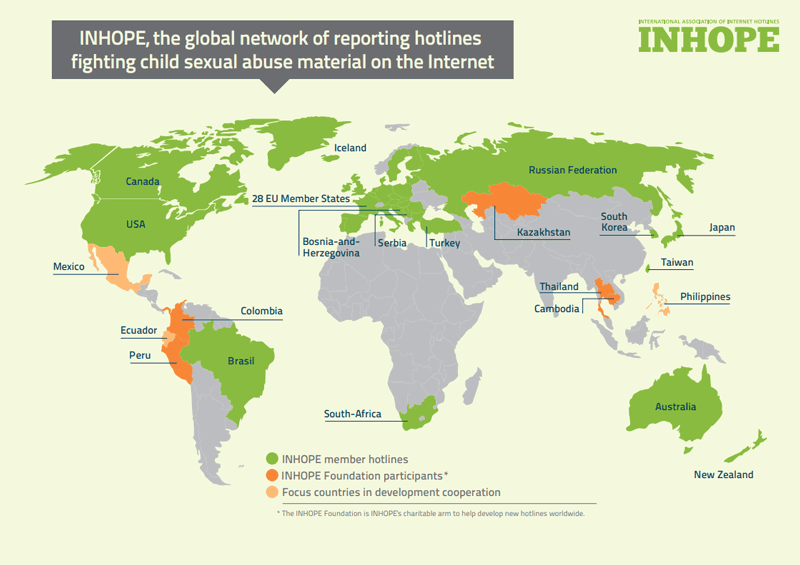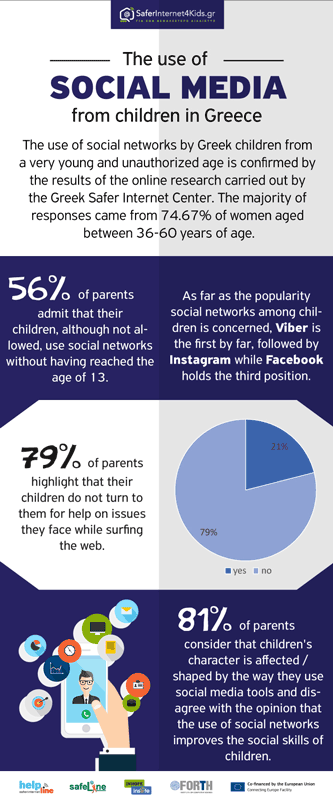by Evangelia Daskalaki, Katerina Psaroudaki (FORTH) and Paraskevi Fragopoulou (FORTH)
In today’s digital world, digital literacy and the ability to think one step ahead when utilising the net is vital. The Digital Agenda for Europe [1] aims to provide and promote digital literacy for every European citizen, with a particular focus on children, owing to their particular needs and vulnerabilities on the internet.
The INSAFE [L1] / INHOPE [L2] are the Pan-European organisations that set out the European strategy for a safe and quality internet. The members of the network work closely together to adopt best-practices for online safety at a European level and interact with all stakeholders to bridge the digital divide between home and school, and between generations.

Figure 1: Map of INHOPE member countries.
The 34 Safer Internet Centres (SIC), 48 hotlines and 32 help-lines operating under the supervision of INSAFE / INHOPE to monitor, co-operate and address emerging trends, while endeavoring to enhance the image of the web as a learning space. SICs make efforts to raise awareness and through close cooperation between partners, law enforcement and other actors, work systematically to eliminate digital illiteracy. They address policy-makers, law enforcement agencies and the internet industry to create a framework that will ensure a better and safer internet and through the organisation of events and campaigns, in an effort to awake and mobilise those involved in every corner of the world. The Greek Safer Internet Centre (EL-SIC) of the Foundation for Research and Technology Hellas (FORTH) is the official Greek representative of INSAFE / INHOPE network.
The Greek Safer Internet Centre at a glance
The EL-SIC in its current form was launched in July 2016 under the auspices of the FORTH, in particular the Institute of Computer Science.
It provides information, assistance and support to young and adult internet users by developing three distinct pillars:
1. The SaferInternet4Kids.gr [L3] portal provides information, including downloadable resources, about the safe use of the internet and social networks. The portal is intended for both parents and educators as well as teenagers and children, and includes appropriate multimedia material. Educational material has already been created and supplemented over time for people with special needs.
2. Through the Help-line [L4], qualified psychologists provide support and advice on issues related to excessive online engagement, online intimidation, exposure to inappropriate content, and other concerns about using the internet, mobile phone and online games.
3. And the Hotline SafeLine [L5] receives reports about child sexual abuse material and illegal online activities [4] and works with both the Greek Police and EUROPOL through European Agency INHOPE.
One of the many achievements of the EL-SIC of FORTH this year was the online research [2] about the use of internet in Greece, based on a sample of 1,100 users. The results of the research confirmed that Greek children use social networks from a very young, ineligible age. It is interesting to note that parents of a higher level of education consider that their child's behaviour is influenced by their social media use and that in times of anxiety their use of social media increases. It has also revealed that social networks can lead to dependency behaviours. The survey further found that 79 % of parents saying their children do not turn to them for help if a problem occurs on the internet. What’s more, 16 % of parents admit that they do not know if their child protects its personal data online and 7 % of parents do not know if their child has ever been a victim of cyberbullying.
The third pillar of EL-SIC for illegal online content, namely SafeLine, has received 34,590 complaints during its course [3], averaging 4,000 complaints annually over the last five years. Of these, 13,000 were judged by legal practitioners to have a criminal background and were promoted either to the competent Greek authorities (Cyber-Crime Unit) or Europol. Most of the reports received by the line relate to personal data and communication violations (39 %). Next are the crimes of child abuse (21 %), which is the main focus of INHOPE's hotlines and online financial fraud (21 %). In the fourth place are the incidents of hate speech and intimidation (14 %), followed by incidents of violence and threats on the internet.

Figure 2: Online research findings.
Links:
[L1] https://www.betterinternetforkids.eu
[L2] http://www.inhope.org
[L3] https://saferinternet4kids.gr
[L4] http://help-line.gr
[L5] http://www.safeline.gr
References:
[1] https://ec.europa.eu/digital-single-market/en/policies/shaping-digital-single-market
[2] https://www.betterinternetforkids.eu/web/portal/practice/awareness/detail?articleId=3003769
[3] http://www.safeline.gr/node/642
[4] Meltini Christodoulaki, Paraskevi Fragopoulou: SafeLine: reporting illegal internet content. Inf. Manag. Comput. Security 18(1): 54-65 (2010)
Please contact:
Evangelia Daskalaki
FORTH, Greece
+30 2810391366











